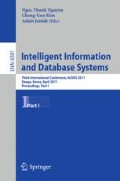Abstract
Social networking is gaining enormous popularity in the past few years. However, the popularity may also bring unexpected consequences for users regarding safety and privacy concerns. To prevent privacy being breached and modeling a social network as a weighted graph, many effective anonymization techniques have been proposed. In this work, we consider the edge weight anonymity problem. In particular, to protect the weight privacy of the shortest path between two vertices on a weighted graph, we present a new concept called k-anonymous path privacy. A published social network graph with k-anonymous path privacy has at least k indistinguishable shortest paths between the source and destination vertices. Greedy-based modification algorithms and experimental results showing the feasibility and characteristics of the proposed approach are presented.
Access this chapter
Tax calculation will be finalised at checkout
Purchases are for personal use only
Preview
Unable to display preview. Download preview PDF.
References
Backstrom, L., Huttenlocher, D.P., Kleinberg, J.M., Lan, X.: Group formation in large social networks: membership, growth, and evolution. In: KDD, pp. 44–54 (2006)
Barbaro, M., Zeller Jr., T.: A face is exposed for AOL searcher no. 4417749. New York Times (August 2006)
Cheng, J., Fu, A., Liu, J.: K-isomorphism: privacy preserving network publication against structural attacks. In: SIGMOD Conference, pp. 459–470 (2010)
Das, S., Egecioglu, O., Abbadi, A.E.: Anonymizing weighted social network graphs. In: ICDE, pp. 904–907 (2010)
Hay, M., Miklau, G., Jensen, D., Towsley, D.F., Weis, P.: Resisting structural re-identification in anonymized social networks. PVLDB 1(1), 102–114 (2008)
He, Y., Naughton, J.F.: Anonymization of set-valued data via top-down, local generalization. In: VLDB (2009)
Liu, K., Terzi, E.: Towards identity anonymization on graphs. In: SIGMOD Conference, pp. 93–106 (2008)
Liu, L., Liu, J., Zhang, J.: Privacy preservation of affinities in social networks. In: ICIS (2010)
Liu, L., Wang, J., Liu, J., Zhang, J.: Privacy preservation in social networks with sensitive edge weights. In: SDM, pp. 954–965 (2009)
Meyerson, A., Williams, R.: On the complexity of optimal k-anonymity. In: Proc. of PODS (2004)
Motwani, R., Nabar, S.U.: Anonymizing unstructured data, arXiv: 0810.5582v2, [cs.DB] (2008)
Park, H., Shim, K.: Approximate algorithms for k-anonymity. In: Proceedings of the 2007 ACM SIGMOD International Conference on Management of Data, pp. 67–78 (2007)
Samarati, P., Sweeny, L.: Generalizing data to provide anonymity when disclosing information. In: Proc. of ACM Symposium on Principles of Database Systems, p. 188 (1998)
Sweeny, L.: k-anonymity: a model for protecting privacy. International Journal on Uncertainty, Fuzziness and Knowledge-based Systems 10(5), 557–570 (2002)
Wasserman, S., Faust, K.: Social network analysis: methods and applications. Cambridge University Press, New York (1994)
Zhou, B., Pei, J.: Preserving privacy in social networks against neighborhood attacks. In: ICDE, pp. 506–515 (2008)
Zou, L., Chen, L., Ozsu, M.T.: K-automorphism: A general framework for privacy preserving network publication. In: VLDB (2009)
Author information
Authors and Affiliations
Editor information
Editors and Affiliations
Rights and permissions
Copyright information
© 2011 Springer-Verlag Berlin Heidelberg
About this paper
Cite this paper
Wang, SL., Tsai, ZZ., Hong, TP., Ting, IH. (2011). Anonymizing Shortest Paths on Social Network Graphs. In: Nguyen, N.T., Kim, CG., Janiak, A. (eds) Intelligent Information and Database Systems. ACIIDS 2011. Lecture Notes in Computer Science(), vol 6591. Springer, Berlin, Heidelberg. https://doi.org/10.1007/978-3-642-20039-7_13
Download citation
DOI: https://doi.org/10.1007/978-3-642-20039-7_13
Publisher Name: Springer, Berlin, Heidelberg
Print ISBN: 978-3-642-20038-0
Online ISBN: 978-3-642-20039-7
eBook Packages: Computer ScienceComputer Science (R0)

